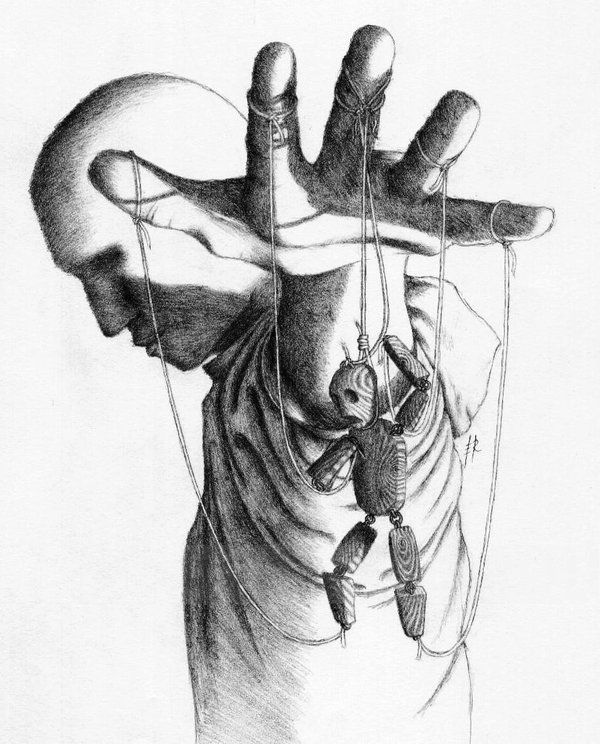 Hamlet possesses qualities that his define him as an artist within this play. His manipulative prowess allows him to "direct" the kingdom of Denmark, using its subjects for his own needs. In addition to this directing capability, Hamlet is also an adept actor, able to put on an "antic disposition" (I.v.192) that he continues to wear throughout the play. Such skills contribute to his attitude as an artist.
Hamlet possesses qualities that his define him as an artist within this play. His manipulative prowess allows him to "direct" the kingdom of Denmark, using its subjects for his own needs. In addition to this directing capability, Hamlet is also an adept actor, able to put on an "antic disposition" (I.v.192) that he continues to wear throughout the play. Such skills contribute to his attitude as an artist.The young prince appears to direct Denmark through his manipulation of its subjects, including Claudius, Gertrude, Polonius, and Ophelia. He has control over Claudius and Gertrude through the performance of "The Murder of Gonzago." By using the play to see their reactions to a scene similar to his father's murder, Hamlet is able to "catch the conscience" (II.ii.634) of both the King and the Queen. His directions given to the players prior to the performance display his intense interest in the play, not only for his plan but also for its artistic merit. He wishes for the players to be as realistic as possible rather than for them to "[imitate] humanity so abominably" (III.ii.37). His purpose for the play is not "to hold... the mirror up to nature" (III.ii.23-24), but rather for the play to be nature itself. He witnesses the King's and Queen's behaviors during and after the play, which he refers to as "The Mousetrap" (III.ii.261). When the king calls out for "light" (III.ii.295), it's as if light has been shed on the situation, proving to Hamlet that the ghost's words are true. Later, Hamlet "directs" his mother by forcing her to choose between his father and Claudius, and he tells her not to continue in her relationship with his uncle.
Throughout the play, Hamlet exhibits a linguistic prowess, making plays on words at any chance he gets. Through this, he's able to fool around with Polonius and treat him as a lesser being. He refers to Ophelia's father as a "fishmonger" (II.ii.190), which Polonius takes as his inability to recognize who he is. However, Hamlet's meaning of the word is to portray Polonius as a pimp, while his daughter is the prostitute. He pokes fun with conception and conceiving, which Polonius takes as his affection towards his daughter; however, it could also be connected to birth and sex, suggesting that Ophelia may be pregnant. He makes fun of Polonius when observing a cloud, stating that it appears as a camel, to which Polonius agrees, then a weasel, to which Polonius again agrees, and then a whale, to which Polonius once again agrees. Hamlet knows that Polonius is a fool, and his relationship with Polonius appears to be that of a puppetmaster and a puppet. He leads Polonius to come up with ideas that he believes are his own but are in fact Hamlet's own creation, such as his madness being a result of "neglected love" (III.ii.192).
After speaking to his father's ghost, Hamlet formulates a plan that involves putting on a show in front of Ophelia. He enters her room "as if he had been loosèd out of hell" (II.i.93) to appear as though he is crazy. She later informs her father of the event, to which he believes is a result of unrequited love, and Polonius formulates a plan to have Hamlet reunited with Ophelia once again. As she's used by Polonius so that he and Claudius can eavesdrop on her conversation with Hamlet, Ophelia is also used by Hamlet in that he plays with her emotions for the necessity of appearing mad.
When with his mother, Hamlet confesses to her that he is not "in madness,/But mad in craft" (III.iv.209-210). Guildenstern also refers to his madness as a "crafty madness" (III.i.8), as if the madness is not Hamlet's actual state of mind but rather of his own creation. Hamlet's ability to appear mad before all the people is a craft in that he is able to convince nearly everyone of his madness. The King, convinced of his lunacy, wishes to send him to England immediately as "madness in great ones must not unwatched go" (III.ii.203). The Queen finds that his vision of his father's ghost is a "bodiless creation ecstasy/Is very cunning in" (III.iv.158-159). Ophelia finds that her lover has been "blasted with ecstasy" (III.i.174). However, it's ironic that he gets angry at the others who "God hath given [one] face, and [they] make [themselves] another" (III.i.155-156), when he in turn is also putting on an act. His anger at the "actors" in his life can also be directed towards himself, as he is also an actor towards everyone else.
No comments:
Post a Comment